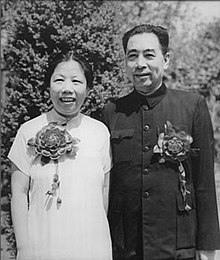Deng Yingchao
| Deng Yingchao | |
|---|---|

Deng Yingchao with Zhou Enlai, 1954
|
|
| Chairwoman of the National Committee of the Chinese People's Political Consultative Conference | |
|
In office June 1983 – April 1988 |
|
| Preceded by | Deng Xiaoping |
| Succeeded by | Li Xiannian |
| Second Secretary of the Central Commission for Discipline Inspection | |
|
In office 22 December 1978 – 11 September 1982 |
|
| Preceded by | Post established |
| Succeeded by | Huang Kecheng |
| Personal details | |
| Born |
4 February 1904 Nanning, Guangxi, Qing Empire |
| Died | 11 July 1992 (aged 88) Beijing, People's Republic of China |
| Nationality | Chinese |
| Political party | Communist Party of China |
| Spouse(s) |
Zhou Enlai (m. 1925–76; his death) |
| Relations | Sun Weishi (adopted daughter) |
Deng Yingchao (simplified Chinese: 邓颖超; traditional Chinese: 鄧穎超; pinyin: Dèng Yǐngchāo) (February 4, 1904 – July 11, 1992) was the Chairwoman of the Chinese People's Political Consultative Conference from 1983 to 1988, a member of the Communist Party of China, and the wife of the first Chinese Premier, Zhou Enlai.
With ancestry in Guangshan County (光山縣), Henan, she was born Deng Wenshu (鄧文淑) in Nanning, Guangxi. Growing up in a poverty-stricken family, her father died when she was at a young age and her single mother taught and practiced medicine. Deng studied at Beiyang Women's Normal School. Deng participated as a team leader in the May Fourth Movement, where she met Zhou Enlai. They married on August 8, 1925 in Guangzhou. She was a legal witness in the wedding of Ho Chi Minh and Zeng Xueming in 1926.
Deng and Zhou had no children of their own. However, they adopted several orphans of "revolutionary martyrs", including Li Peng, later a Premier of the People's Republic of China. She promoted the abolition of foot binding imposed on women.
She died in Beijing at the age of 88.
...
Wikipedia
